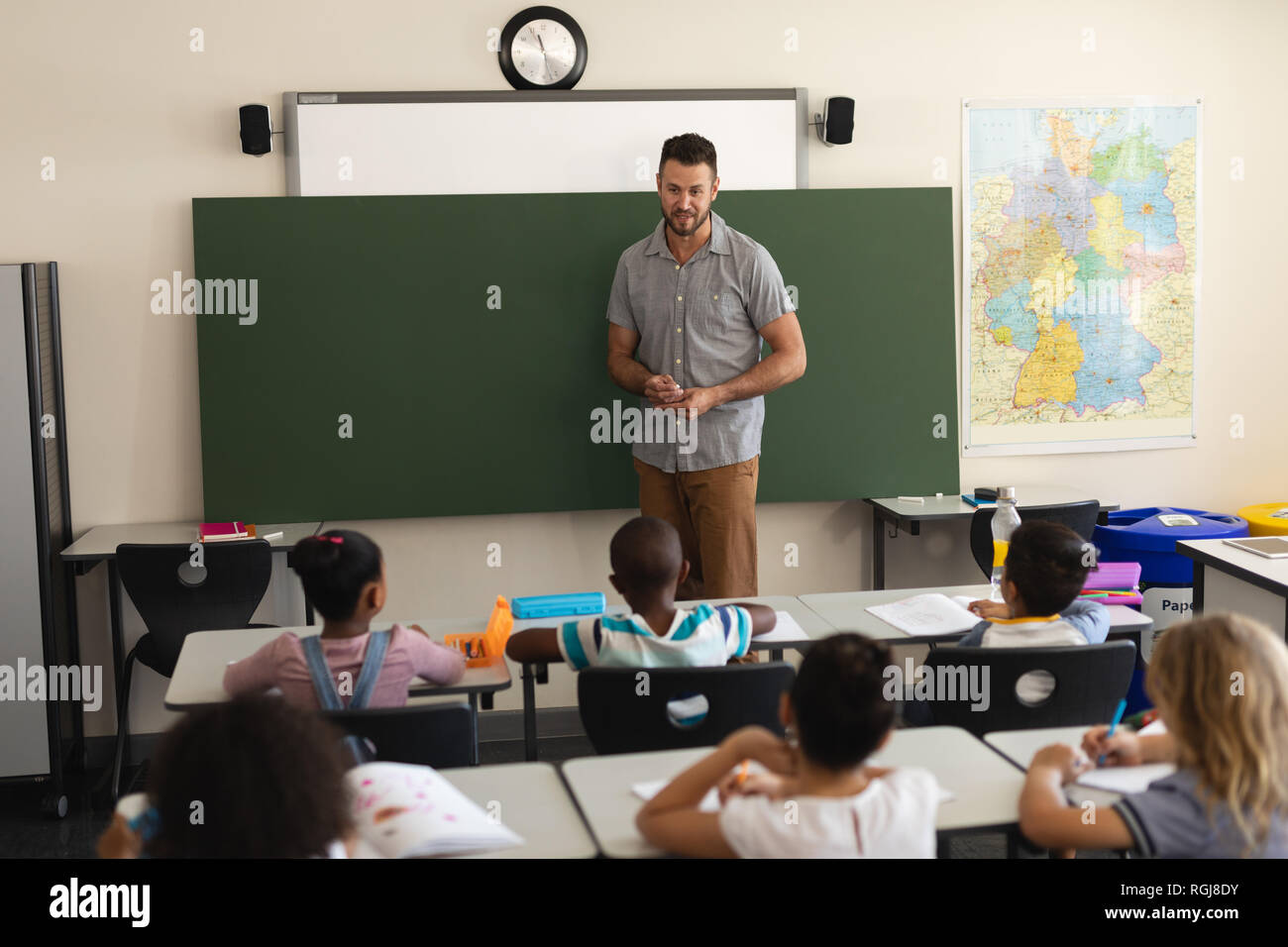Effective Primary Science Tuition Singapore for Better Exam Results
Effective Primary Science Tuition Singapore for Better Exam Results
Blog Article
Discover the Necessary Benefits of Recognizing Primary Scientific Research for Young Students
The importance of key scientific research education for young learners prolongs much past simple understanding purchase; it offers as a fundamental pillar in establishing vital skills such as crucial thinking, analytical, and imagination. Engaging with clinical principles with interactive and inquiry-based activities not just grows inquisitiveness but likewise lays the groundwork for resilient, positive learners.
Enhancing Vital Believing Abilities
Promoting important thinking abilities in young students is vital for their cognitive development and future academic success. Vital thinking enables kids to evaluate information, evaluate proof, and make educated choices, which are important skills in today's information-rich society. By involving in clinical inquiry, young learners can boost these skills as they discover ideas via monitoring, reasoning, and testing.
In primary science education and learning, instructors can assist in important thinking by encouraging trainees to ask inquiries, formulate hypotheses, and perform experiments. This hands-on strategy allows youngsters to practice analytic and create rational reasoning abilities. When students explore the homes of materials or the principles of activity, they discover to assess their searchings for critically and draw verdicts based on proof.
Furthermore, conversations and joint projects can promote important thinking by giving chances for learners to verbalize their thoughts, obstacle presumptions, and think about varied point of views. By creating a helpful setting that values inquiry and reflection, educators can support critical believing abilities that encourage young learners to end up being lifelong learners and independent thinkers. Inevitably, improving these abilities lays a robust foundation for their future scholastic endeavors and personal growth.
Promoting Interest and Exploration

Key scientific research education offers an organized atmosphere where young students can discover various phenomena via hands-on experiments and observations. By enabling them to communicate with products and take part in inquiry-based discovering, instructors develop possibilities for youngsters to develop theories, evaluate their ideas, and draw final thoughts. Such experiences support a feeling of wonder and excitement concerning science.

Structure Self-confidence in Trouble Resolving
Building confidence in problem-solving is an essential element of primary science education that encourages young students to approach difficulties with resilience and creative thinking - primary science tuition Singapore. They develop necessary skills in essential reasoning and analysis when children are urged to involve with clinical ideas through hands-on activities and inquiry-based learning. This procedure not only enhances their understanding of scientific concepts but additionally cultivates a sense of ownership over their understanding
To construct confidence, instructors must produce a supportive atmosphere where mistakes are checked out as chances for development rather than failures. This motivates trainees to take risks and explore various options to issues. By giving scaffolding and advice, teachers can aid students navigate intricate jobs, gradually increasing their self-reliance in analytic situations.
Moreover, collective discovering experiences, such as group tasks or experiments, can even more boost students' confidence as they discover to articulate their thoughts and listen to others' point of views. These communications support social abilities and strengthen the concept that analytic is usually a cumulative endeavor. Ultimately, cultivating self-confidence in problem-solving prepares young learners for future scholastic difficulties and outfits them with the devices necessary for long-lasting knowing.
Encouraging Creativity and Advancement
In the realm of key science education and learning, motivating creativity and advancement is essential for cultivating a vibrant knowing environment. By promoting a society where young students can discover ideas and experiment openly, teachers help students establish essential believing skills and an interest for exploration. Creativity in scientific research motivates children to More Bonuses ask inquiries, create theories, and participate in hands-on tasks that stimulate their creative imagination.
Incorporating open-ended jobs and inquiry-based learning into the curriculum enables pupils to express their one-of-a-kind point of views and options. As an example, when entrusted with resolving a trouble associated to their atmosphere, students can conceptualize multiple approaches, causing innovative results that showcase their originality. This not only strengthens their understanding of clinical principles yet additionally instills a feeling of ownership over their knowing process.
In addition, innovative science education nurtures cooperation among peers, as students typically share ideas and construct on one an additional's insights - primary science tuition Singapore. This collaborative spirit promotes not just technology however additionally important social abilities. Thus, by focusing on creative thinking and development in primary science education, we empower young students to believe seriously, embrace obstacles, and imagine opportunities, laying a solid foundation for long-lasting learning and expedition
Getting Ready For Future Learning Challenges
Young students' capability to navigate future understanding difficulties rests on a solid foundation in primary scientific research education and learning. This fundamental understanding equips pupils with critical thinking abilities and a systematic approach to problem-solving, necessary for tackling complex problems see this website in an ever-evolving globe. Primary scientific research fosters inquiry-based understanding, encouraging trainees to ask questions, check out theories, and engage in hands-on experiments.
As they establish these skills, students come to be experienced at assessing data, identifying patterns, and attracting educated verdicts. Such expertises are crucial not just in scientific fields yet additionally in technology, design, and mathematics (STEM), where interdisciplinary knowledge is significantly crucial.
In addition, main scientific research education grows a sense of curiosity and resilience in young learners, enabling them to check out challenges as possibilities for development. As they experience and get rid of obstacles in their clinical expeditions, they construct self-confidence in their capacity to adjust and introduce.
Inevitably, a solid foundation in main scientific research not just prepares young students for academic quests but likewise outfits them with the tools necessary for lifelong discovering and versatility in a rapidly changing international landscape. By buying main scientific research education and learning, we are purchasing the future potential of our students.
Verdict
Understanding key scientific research is critical for young students, as it promotes critical reasoning, interest, and creativity. Inevitably, the benefits of primary scientific research education and learning prepare youngsters for future academic quests and instill long-lasting knowing routines necessary for thriving in an ever-evolving globe.
The importance of main science education for young students extends far past simple expertise procurement; it offers as an essential pillar in creating vital skills such as essential reasoning, analytical, and creative thinking. By producing a helpful atmosphere that values questions and reflection, educators can support critical assuming abilities that encourage young learners to become independent thinkers and lifelong learners. Therefore, by focusing go to website on creativity and development in primary scientific research education, we equip young learners to believe critically, embrace challenges, and envision opportunities, laying a solid structure for lifelong understanding and exploration.
Young students' capability to browse future learning obstacles pivots on a strong structure in primary scientific research education and learning.Comprehending primary scientific research is essential for young students, as it promotes crucial reasoning, inquisitiveness, and imagination.
Report this page